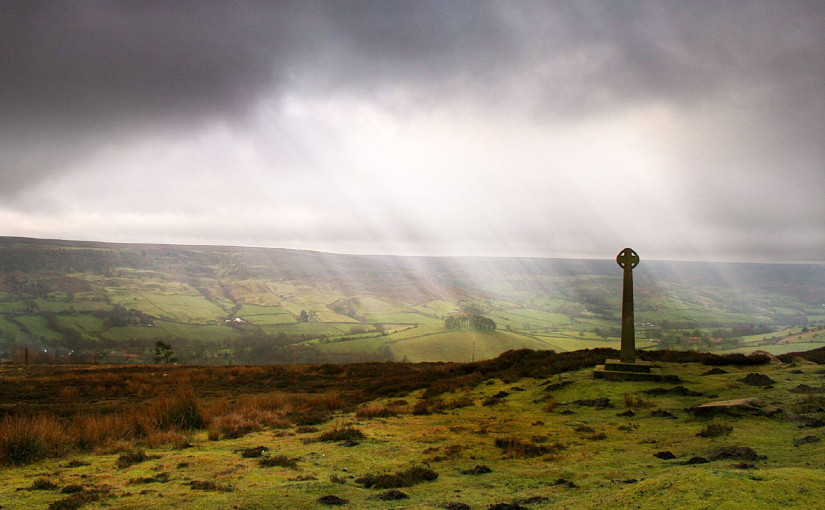Since I’ve been writing I’ve gotten some interesting comments. Some are conventional Christians who don’t seem to “get” what I’m doing. They either don’t read or misunderstand what I’m writing. Truly, they are stuck in narrow ideas of what is right and what is to be believed, and any other, any strange type of thought is basically Satan. Others are different, their polar opposite, as in, “I don’t believe in the fairy in the sky.” And this, which inspires the writing here: that the idea of God, etc., is “a bunch of mythological stories that have no place in 2015”. This side… it is more of what I can relate to. And I think I have an answer to its line of argument. I do not have an response to the other side, those who are stuck in doctrine, what traditional religion affords. In my experience they cannot be reasoned with, for they think that God is with them. But the atheists: these most likely have had religion pumped into them, and have had cause to reject it. Yes, they can be pig headed, too, but I think it is with them that Jesus himself would have sat with. And if the conventional Christians asked why, it would be, “The ones who need a doctor aren’t the healthy but the sick.” [Mark 2:17]
First let’s look at why conventional Christians are so annoying (including Mormons and Jehovah’s Witnesses, who actually bring the Annoying to where you live). They can be forgiven, if you think about it. In their mind, the only way that anyone will go to Heaven when you die, the only way anyone can be “saved”, is if they accept the belief that Jesus Christ is the Son of God and that he came back from the dead on the third day after his crucifixion. Maybe one might also add that we’re waiting for him to come back. So in being “annoying” as I’ve said, in their mind, their imposing their beliefs on you is the greatest thing that they can do, because the possibility exists that with their proselytizing that they are saving your immortal soul from an eternity in the flames of Hell. At points, I have taken to be of the Annoying. But I snapped out of it, and my reason is scriptural: Jesus said, “No one can come to me unless the Father who sent me draws him.” [John 6:44] I would find other reasons, later.
So, am I positing that the traditional notions of how salvation works—that the mechanisms are not in fact what they have been believed to be? Or even further, is the thought itself about God and Jesus an archaic notion that we have outgrown? Can we evolve religious thought to the point where they are relevant to the here and now, some two millennia after the Blessed One left the building? One wonders if we are not working along the lines of the Ancient Aliens mode of thought. Basically, when all you have is a hammer, everything looks like a nail. I watch that show, and it seems for every single “extraordinary” occurrence, we invoke the idea that ancient extraterrestrials are the most likely cause. Science teaches us that we should suspend judgment until we have verifiable evidence that a certain thing is true. The claims of many religions—are they a part of the same general conversation as those claiming that the ancient gods were actually aliens from a distant star? Some skeptics call themselves “Pastafarians”, and they say their god is the Flying Spaghetti Monster, telling you that your belief in “higher powers” are just as ridiculous. Are we at something of a crisis point in religion? For to any awake spiritualist, the FSM people really do have a point.
The last crisis in God, in my reckoning, happened to the Jews in 586 BC. This was the beginning of the Babylonian captivity, when the great temple built by Solomon was destroyed—where in fact the Jew’s God, Yahveh, was supposed to have had His dwelling on earth. But instead of that being the end of their whole belief system (for it usually was thought that if one people defeated another, it was one god triumphing over another), their faith, in fact, became stronger. Much stronger. Before, though they professed to only worship Yahveh, there has been found in the archeology of where they lived, many idols—of other gods. But after their exile in Babylon? Zip. None. They believed it was because of those other gods that they were allowed to be so captured, so they paid attention to that first commandment: “Thou shalt have no other gods before me.” And that was the other point: it was actually God acting through the Babylonians as His intermediaries that God brought judgment upon them. Yahveh was not only now the God of the Jews, He was the God over everyone. And that was how it played out in the last crisis.
Perhaps this new crisis doesn’t seem anywhere near as severe as that last one. This one I would say has its source in the repercussions of the Enlightenment. When Nietzsche famously said, “God is dead.” This was when we stopped believing in fairy tales, one might put it. Rationality had gotten in vogue. It was as if we had been carrying a load, going down the road we had always been going down, when suddenly we asked, “Why are we doing this?” And sought instead to unburden ourselves. We looked at the idea of God, and of religion, and a lot of us decided that it didn’t make sense. Not anymore. Not when we had better ideas of why things were they way they were. We started seeing more and more naturalists, those who saw explanations for things in natural order as opposed to “because God”. It has been, so far, a very fruitful way of looking at the world, a view that has given us our current state of science and technology. And so there we have it, why that person had deigned to remark that the idea of God had no place in this current age, well past the Enlightenment. We should stop looking for that fairy in the sky.
This is the crisis now. As Julian Huxley put it, “Operationally, God is beginning to resemble not a ruler, but the last fading smile of a cosmic Cheshire Cat.” He does seem to have a point, no? Who used to cause lightning? God. Now? It’s just a large charge that travels that path you see, usually from the ground up. What used to be there when you looked up? God in His Heaven. Now? God is definitely not looking down on us from there. There’s mostly empty space, sad to report. We have moved, most of us who still believe, we have moved the “real” Heaven into a completely separate dimension, which mortal eyes seldom travel to. The functions and trappings of God have been invaded… by science, it would appear. Or has it? Couple interesting points, one being that when Jesus ascended into the sky, he disappeared into a cloud; he did not do a “rocket man” sort of stunt and keep going. And the other is that Paul says there is the seen world, and the unseen world, and whereas the seen world is temporary, the unseen world was the one that would keep going. Things like these two are mysteries that can perhaps survive whatever science throws our way. Especially if science can actually make sense of them as they are described in our holy books.
But maybe they have a point. Maybe a God who tells us to kill every last single living being in a city because of their sinful ways—maybe that kind of God we can do without. Maybe it was good way to go back then, when we were without even a Roman road system in place, but now? We don’t look so adoringly at whoever it is that has us kill people, for whatever reason. But nowadays, if He’s not telling us to enact things like that, what is it that He is doing, way “up there”? Why exactly do we need Him, again? Maybe we need another way of looking at things. Could it be, that as He abandons the closer spheres, as He seems to move out of our focus, does He draw us—our imagination—out into the far expanse in following where He retreats to? Let those who have eyes see. So, as we look back to what happened in the previous crisis, is this the next quantum leap that we utilize to solve things, to rescue God from irrelevance, a natural next vault? The idea of God, we to place it properly in the frame of new paradigms. Because however far out we go, might we find that He is already there, having waited for us to figure it out.
Even were there no mystery to the world at all, you know there still would be one that will defy all efforts to codify? We ask, what is love? For the most profound words that ever was written, anywhere, throughout history and into the furthest future, is the minimal sentence in 1 John: “God is love.” C. S. Lewis wrote about that phrase that we should understand it doesn’t mean, “love is God,” but I beg to differ. I think that that is precisely what it means. As Oscar Wilde put it, “The mystery of love is greater than the mystery of death.” There is nothing real but love, no matter how tangible that thing might be. Now, seeing that we say of some phenomena that it is not “because God”, then God retreats from the science—when there is no mystery, there is not God, it seems—but that most profound statement will ensure that there will always be somewhere God has His space: “God is love.” Because if you say you know what love is, I will ever say you are a fool in your simplicity. And that is not the good simple, for it is that love itself is so simple, we’ll never understand it.
As far as God’s seeming brutality, one looks to the Book of Job for an answer, for one thing. It is Satan who brings disaster to Job, but at the end, when God finally speaks, He merely asks, who are you to judge Me? Satan is not mentioned at all. It might most possibly be that something was going on “behind the scenes”, as it were, in the seeming cruelty behind some of God’s decrees. There is certainly mystery there, and we may never fully understand it. And look at the Son of God: was not he himself cruelly put to death? He says that he is doing the Father’s will, yet is it not the Devil who orchestrates the whole affair? Can we see some sort of pattern here? God means for all this to happen! But—and this is an important but—He knows how all of this will turn out! Out of the horrors that avail themselves of this world, the pain will have an end. It is so written. And back to where God directly orders to kill: I will not cop out and say that God makes up for it to the victims of those orders. There is another possibility, that that, along with other stories about God in the Bible, were not meant literally that they happened as written. Perhaps another cop out. My thoughts: He works with the tools that exist.
His message to the early Hebrews, by ordering mass killing? I am no one to be trifled with. This establishes Him among the ancients in a way that nothing else could. Yes, to our modern sensibilities it is cruel, perhaps evil to do things in this way, but do we call the lion who kills his prey evil? Who are we to judge Him? Back to Job again. Where were you when He fluctuated the original wave that caused matter to coalesce in just that certain way, for the stars to align in subtle gravity, back at the Big Bang? Because as God became larger in the first crisis of faith, in this one, He takes His final size: greater than the billions upon billions of galaxies where in each one are billions upon billions of stars, each burning nuclear light—all that is a mote in His eye. Do you understand the concept: infinity? You know, you can; it’s in those three words: God is love. Isn’t that His way, though? Love is the chiefest and best way to know infinity. To know the mind of God.
It is what Lucifer failed to understand: you cannot kill God. And as our perspective on the Supreme Being shifts, so that He appears different to us than in generations past, one might say that we have now more or less a “grown up” picture of Him. When this race, the human race, was young, we were fed with milk. And now we are ready for the solid food. We are finally at the point where we understand what it means: civilization. Everyone as equals, with all due basic human rights. We have (right now!) the means by which the entire world may be fed. Verily, the prophet quoth: “The Beginning is near!” And perhaps it needs to get worse before it gets better, but it will get better. Now, watch as the idea of God grows up, for it may be that we do not need Him in the Age of Gold that tantalizingly peeks out at us at the horizon’s edge, but the world will only make sense if He is in it. God is waiting for us to understand the world enough that we don’t use Him as a placeholder. To see what it is, His true function: God is love. Even if you don’t believe in Him at all.
If you like what’s written here, check out my book, Memoirs from the War in Heaven.





